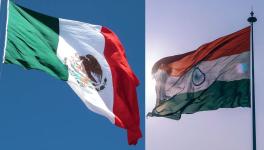No End in View for Ukraine War
The US National Security Advisor Jake Sullivan’s meetings with Ukrainian leaders, including President Vladimir Zelensky, in Kiev has created a lot of confusion and misperceptions. One the one side, the White House maintains that the trip aimed “to underscore the United States’ steadfast support to Ukraine and its people.” The readout stated that Sullivan also affirmed “the continued provision of economic and humanitarian assistance, as well as ongoing efforts with partners to hold Russia accountable for its aggression.”
However, unnamed US officials gave the spin that Sullivan’s real mission was to “nudge” Zelensky to negotiate with Moscow and urge that “Kyiv must show its willingness to end the war reasonably and peacefully.” Politico later reported that Zelensky indeed heeded Sullivan’s “soft nudging”. The US media also reported that the US officials have been nudging the Ukrainians for some time.
The Washington Post reported last week that the Joe Biden administration privately encouraged Ukrainian officials to show they are willing to engage in dialogue with Russia, in an acknowledgment of the growing frustration in the US and some of its allies at the cost and duration of the war. But, apparently, the Ukrainians pushed back.
Sullivan also added some spice to the media speculation by claiming on Monday that the US has channels to communicate with Russia at senior levels. The Wall Street Journal had earlier reported, citing unnamed US and Western officials, that Sullivan had allegedly held a series of confidential meetings recently with Kremlin aide Yury Ushakov and Russian Security Council Secretary Nikolay Patrushev on the conflict in Ukraine. (Moscow has not reacted to these reports.)
The heart of the matter is that Sullivan has been on a PR exercise in the run-up to the midterms in the US (November 8) in a concerted strategy aimed at countering the growing criticism among the Democrats and Republicans that the Biden Administration is avoiding the diplomatic track to try to end the war in Ukraine. That apart, Sullivan’s theatrics also achieved the purpose of distorting the perception that it is Zelensky who is recalcitrant about dialogue and peace talks — not Biden.
In fact, all indications are that the Biden Administration is preparing for the long haul in Ukraine. Stars and Stripes reported on Wednesday that a three-star general will lead a new Army headquarters in Germany called the Security Assistance Group Ukraine, or SAGU, that will include about 300 US service members responsible for coordinating security assistance for Ukraine.
On Sunday, The New York Times had reported last Friday that Lt. Gen. Antonio Aguto Jr., head of the First US Army headquarters at Rock Island Arsenal in Illinois, was a leading candidate for the new job.
The SAGU will be based out of US Army Europe and Africa headquarters in Wiesbaden. Sabrina Singh, the deputy Pentagon press secretary, told reporters the new command will “ensure we are postured to continue supporting Ukraine over the long term.” She added the US remains “committed to Ukraine for as long as it takes.”
It is improbable that Moscow has fallen for Sullivan’s dissimulation. There is reason to believe that Sullivan who is a thoroughbred neocon from the Clinton clan would only have urged Zelensky to expedite the planned Ukrainian offensive on Kherson, which has been in the making for quite a while as a decisive battle for the Crimea and control of the Black Sea/Azov Sea ports and is critical for Ukraine’s long-term viability as a prosperous nation and of vital interest to the US and NATO for the encirclement of Russia.
Above all, the Biden Administration is badly in need of a success story from Ukraine as the newly-elected Congress convenes in January with a likely Republican Party majority in the House of Representatives.
No doubt, the Russians are taking the Ukrainian offensive in Kherson seriously. In a stunning announcement in Moscow on Wednesday, Russian Defence Minister Sergey Shoigu ordered a troop pullout from the western side of the Dnieper River in the Kherson Region.
The fact that the Kremlin is risking criticism from the Russian public opinion for ordering such a retreat (from a region that Putin decreed is an integral part of Russia) underscores the gravity of the Ukrainian military threat and the imperative needs to strengthen the defence line.
Zelensky is forcing Moscow to literally eat its words about the “demilitarisation” of Ukraine! He continues to be in a belligerent mood. On Monday, Zelensky did make a peace offer but with five conditions for a settlement:
·Restoring Ukraine’s territorial integrity;
·Russia respecting UN Charter on sovereignty and territorial integrity;
·Russia paying off all war reparations;
·Punishing each war criminal; and,
·Guarantees that such an invasion and atrocities will not happen again.
The only “concession” Zelensky made is that he didn’t mention his earlier precondition that President Vladimir Putin should relinquish office before any negotiations. It is a non-starter.
There is no end in view for the war in Ukraine. By the way, although the midterm elections are typically the point in a US presidential cycle where one expects to see top Cabinet members begin to turn over, there is no sign of that happening to Defence Secretary Lloyd Austin.
Austin, 69, being a critical voice in the Ukraine conflict, who mobilised billions of dollars worth of military aid from around the world for Kiev, Biden anticipates that the war effort may only become more entrenched and this is not the time to change up the top ranks of the Pentagon.
Indeed, the ground situation shows that the ongoing Russian operations in the areas of Ugledar and Bakhmut in Donetsk have run into strong resistance from Ukrainian forces, contrary to the Russian narrative that Kiev’s military is in a shambles and is a demoralised lot.
In particular, the advance of the Russians around Ugledar got stuck in the mud in the village of Pavlovka, located on the important crossroads, and in a fierce battle three days ago, reportedly, there were heavy casualties on both sides. Putin’s decision to retreat in Kherson was probably with the hope of avoiding a similar fate, as the Russians are experiencing logistical difficulties to supply their forces on the western side of Dnieper river.
Of course, this seamy picture is not the whole picture insofar as the phase of regrouping and resupplying following the Russian mobilisation is still a work in progress and the ongoing fighting in Donbass and Kherson is at the tactical level and does not involve large movements of troops.
Equally, the intensive Russian strikes on Ukrainian depots, command centres and artillery and air-defence systems plus the destruction of Ukraine’s military-industrial facilities and energy system are yet to impact Kiev’s capacity to wage the war.
Meanwhile, the situation on the front lines in Kherson region remains extremely tense for the Russians. The Ukrainian forces are on the prowl poking the Russian defence line incessantly to break through to advance toward the city of Kherson. A large-scale Ukrainian offensive backed by western advisors and mercenaries is to be expected any day. So far, Russian are holding their positions, repelling the ongoing Ukrainian attacks and fortifying their defences.
From Kherson city, Ukrainian artillery can threaten Crimea. In the prognosis of Moscow’s close ally, Serbian President Aleksandar Vucic, “Challenging times are ahead of us. Next winter will be even harsher than this one because we’re facing the Battle of Stalingrad, the decisive battle in the conflict in Ukraine, the battle for Kherson.” He predicted that both sides are likely to deploy thousands of tanks, aircraft and artillery pieces in the struggle for the key city.
Vucic said: “The West thinks it’ll be able to ruin Russia that way, while Russia believes it’ll be able to defend what it secured at the start of the war and bring it to an end.”
MK Bhadrakumar is a former diplomat. He was India’s ambassador to Uzbekistan and Turkey. The views are personal.
Get the latest reports & analysis with people's perspective on Protests, movements & deep analytical videos, discussions of the current affairs in your Telegram app. Subscribe to NewsClick's Telegram channel & get Real-Time updates on stories, as they get published on our website.
























